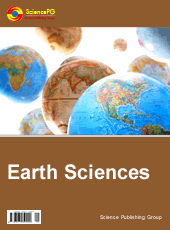
 Open Access
Open Access
Earth Sciences
| ISSN Online: 2328-5982 |
| ISSN Print: 2328-5974 |
| Current Issue: Volume 13, Issue 2, April 2024 |
| DOI: 10.11648/j.earth |
| http://www.sciencepg.com/journal/earth |
1-2 weeks
Time to first decision
4-6 weeks
First decision to acceptance
1-2 weeks
Acceptance to publication
100%
Open Access
Submission Guidelines
We're committed to making your publishing experience as easy and efficient as we can. Our submission guidelines will offer you the essential resources and guidance for a successful process of submitting and publishing your article.
View MoreEditorial Board
Earth Sciences benefits from a distinguished editorial board, who actively engage in the peer review process, providing direction for ongoing development to ensure the journal remains dynamic in the field.
Meet the Editorial BoardReviewer Guidelines
We encourage you to explore our reviewer guidelines, where you'll discover valuable insights and practical tips to enhance your role as a peer reviewer, promoting a constructive and efficient peer review experience.
View MoreSpecial issues are collections of articles centered around a subject of special interest, which are organized and led by subject experts who take on the role of the guest editor. Authors should be aware that articles included in special issues are subject to the same criteria of quality, originality, and significance as regular articles.
Sustainable Territorial Development in Latin America in the 21st Century
Lead Guest Editor: Prof. William Dos Santos Melo
Submission deadline: 1 October 2024
The Responses of Ecological Vulnerability to Climate Change and Human Activity
Lead Guest Editor: Bing Guo
Submission deadline: 31 August 2024
Propose a Special Issue
By proposing a special issue, you have the opportunity to undertake the role of lead guest editor and curate a collection of articles focused on a subject of particular interest. This allows you to showcase and explore the chosen topic in-depth.

Benefits of the Lead Guest Editor
Serving as a lead guest editor can bring a variety of career benefits, such as the following:
|
|
Be awarded a certificate of honor (electronic version). |
|
|
Get your name listed on the journal's website. |
|
|
Be at the forefront of scientific communications. |
|
|
Contribute to and receive recognition from the academic community. |
|
|
Assemble and work with a strong team of Editors. |
Thank you to all the peer reviewers who generously donated their time and expertise to Earth Sciences publications. Your contributions are invaluable in maintaining the high-quality standards of our publications.
How to be an effective Peer Reviewer?
Our comprehensive guide on becoming a peer reviewer provides you with all the essential information to embark on this role successfully. It covers the following key aspects:
|
|
The peer review process |
|
|
Writing review reports |
|
|
Ethical guidelines for peer reviewers |
Why should you consider becoming a Peer Reviewer?
Engaging in the peer review process not only significantly contributes to the scientific community but also brings considerable benefits for your own research and career development. At SciencePG, we always appreciate and welcome professionals who are interested in becoming part of our dedicated reviewer team.
 |
Stay at the Forefront of Research As a reviewer, you gain an exclusive opportunity to have an early glimpse of the exciting new research conducted in your field. Moreover, peer review empowers you to play a vital role in evaluating and enhancing this cutting-edge work. |
 |
Enhancing Your Writing Skills Thorough reviewing articles written by other researchers can provide valuable insights for improving your own work. Unlike reading an article solely for research purposes, the review process prompts you to think critically about the elements that contribute to the quality of the article. This reflection can enhance your understanding of a well-designed study. |
 |
Boost Your Career Although much of the review process is conducted anonymously, there are initiatives to recognize reviewers for their significant contributions. Additionally, you will have the opportunity to include your review experience in the Curriculum Vitae, showcasing your valuable involvement to the scholarly community. |
Earth Sciences maintains an Editorial Board of practicing researchers from around the world, to ensure manuscripts are handled by editors who are experts in the field of study.
Join the Editorial Board
Would you like to make a valuable contribution to the scientific community by joining the editorial board of this journal? Or perhaps you're a current editorial board member who wishes to recommend a colleague for this role? Your interest and suggestions are highly appreciated and warmly welcomed.
Benefits for Editorial Board Members
Joining the Editorial Board is an opportunity to be recognized as an expert in your field and to contribute to the peer review process of cutting-edge research. By acting as editor, you will have the opportunity to shape the future of research in your field and be part of a community of like-minded researchers.
As an editorial board member, You will Benefit from:
 |
Enhancing your academic influence and enriching your resume. |
 |
Receiving a certificate acknowledging your contributions to the journal. |
 |
Having your name listed on the journal website. |
 |
Gaining access to the latest research in advance and making new contacts in your research field. |
 |
Networking with other scholars in your field and broadening your academic connectivity. |
AcademicEvents is an academic event planning platform initiated by Science Publishing Group (SciencePG). AcademicEvents aims to fostering collaboration and facilitating the dissemination of innovative ideas. Whether you're an esteemed professor, a dedicated researcher, or a curious student, our platform provides comprehensive support for hosting academic events in diverse disciplines.


Webinars are typically executed as online events, following the initial planning.
Learn More |Organize a Webinar
You have the flexibility to organize workshops either in-person or virtually, based on your preference.
Learn More |Organize a Workshop
Conferences are traditionally conducted face-to-face, with in-person attendance being the norm.
Learn More |Organize a ConferenceAcademicEvents strives to provide you with a seamless experience. By organizing academic events under our service, you will connect with like-minded individuals and expand your professional network. Besides, our user-friendly interface allows you stay informed about the latest conferences in your field of interest.
We also provide publishing services for conference content (past or upcoming conference). The ideas generated during the conference can be developed into articles or abstracts for publication.



Pages: 49-57 Published Online: 2 April 2024

Pages: 39-48 Published Online: 28 February 2024

Pages: 14-38 Published Online: 21 February 2024

Pages: 8-13 Published Online: 1 February 2024

Pages: 1-7 Published Online: 18 January 2024

Mangrove Interspecies Classification Based on UAV Hyperspectral Images
Pages: 244-248 Published Online: 14 December 2023